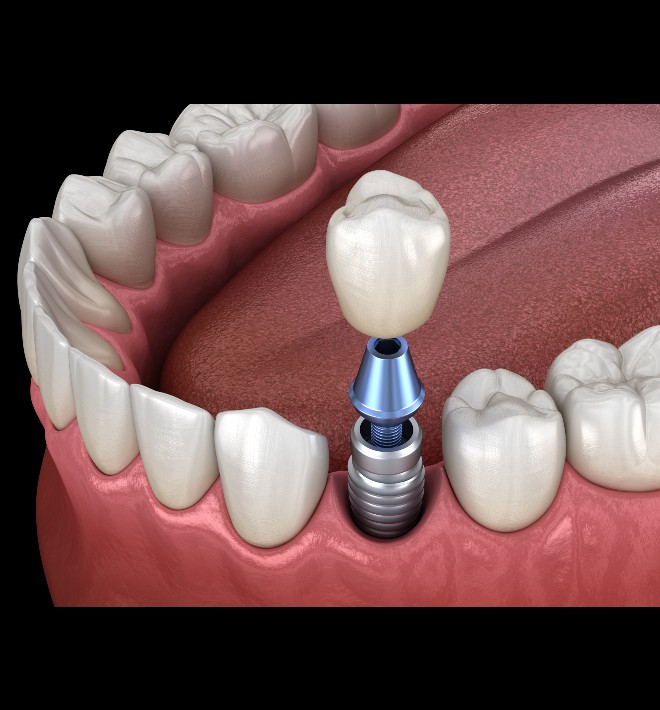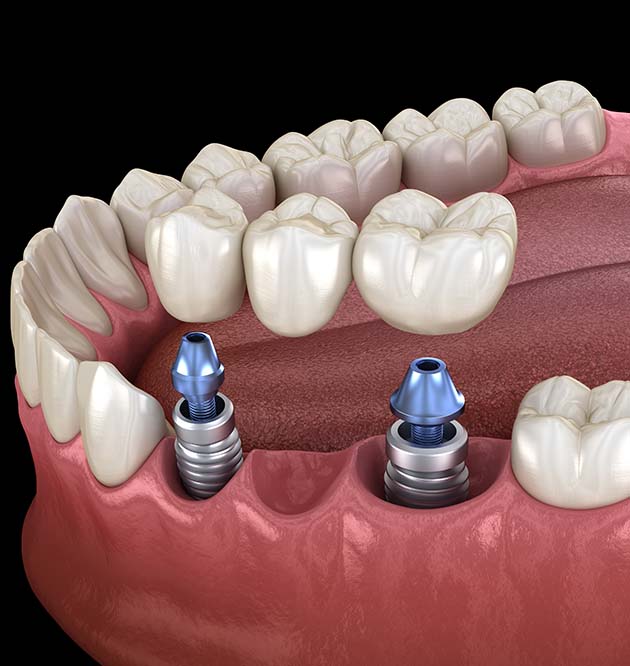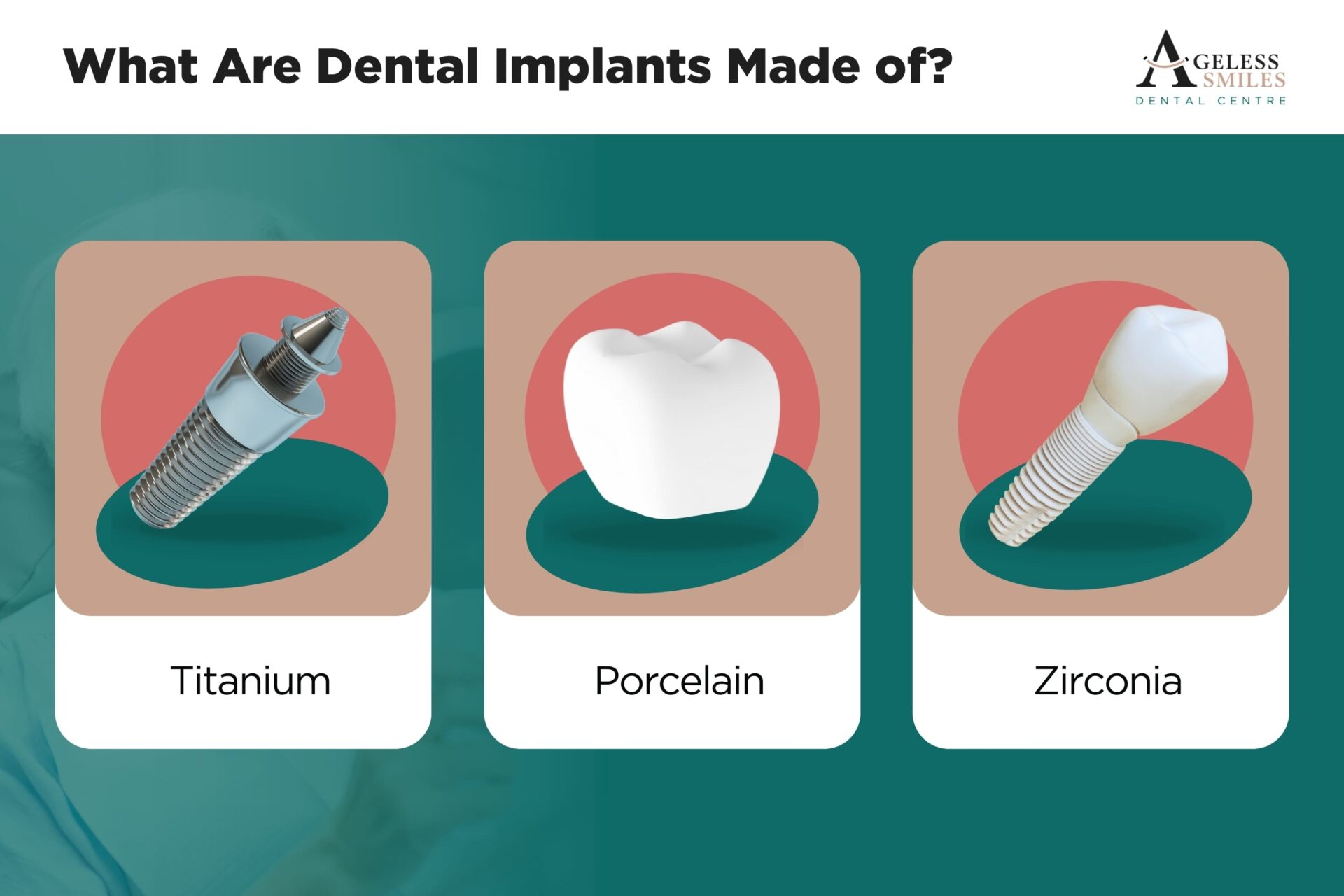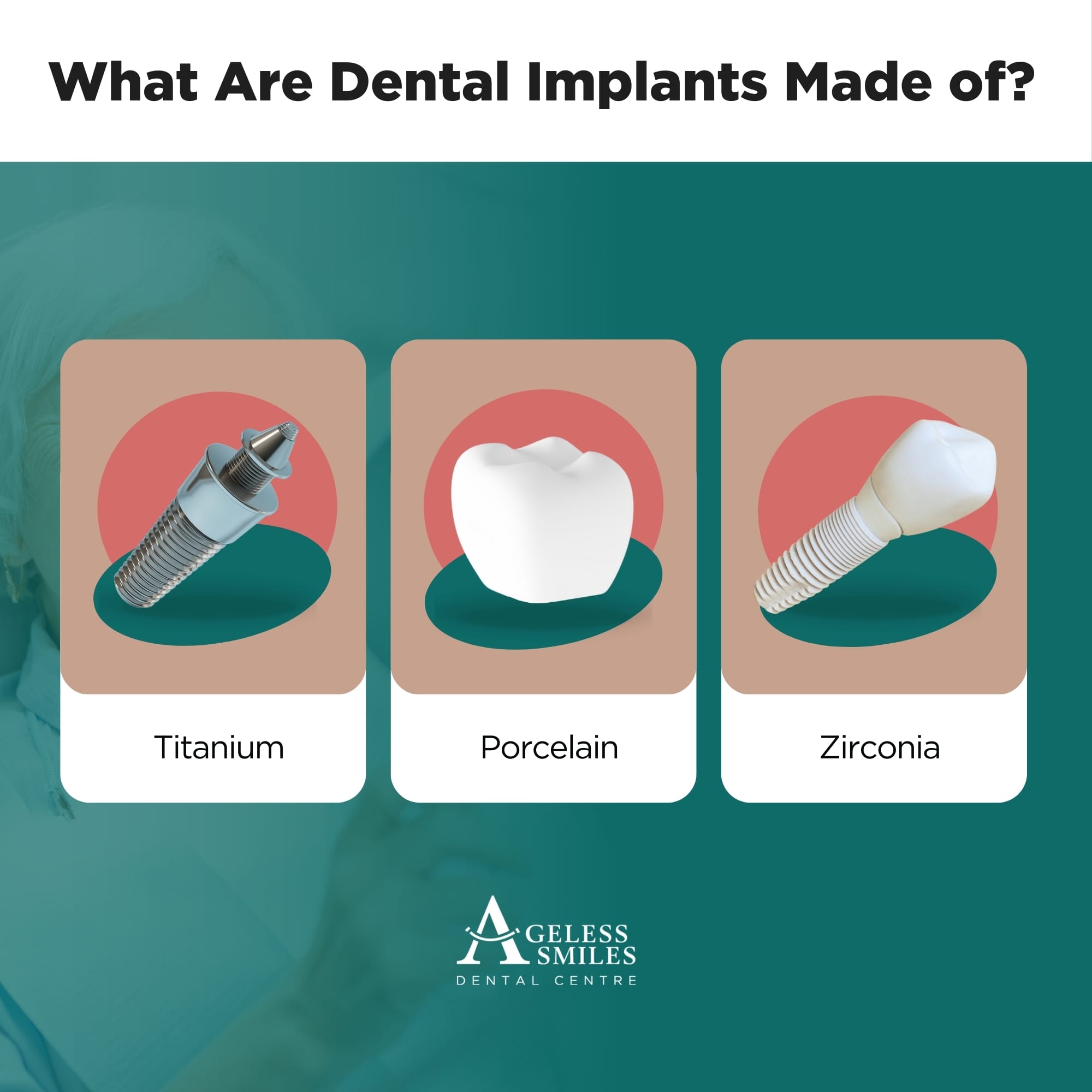
At Ageless Smiles Dental Centre, we believe in transparency, and that includes helping you understand the materials we use to create your long-lasting, dazzling smile.
Choosing dental implants for a stunning smile is investing in your future. But have you ever wondered what materials dental implants are made of? In Australia, titanium remains the standard option, representing over 90% of dental implants. While less common, zirconia implants are gaining popularity due to their aesthetic advantages. Zirconia’s white colour closely resembles natural teeth – an appealing option for implants and crowns in the front of the mouth.
What Are Dental Implants Made of?
Most dental implant roots and abutments are made of titanium or zirconia, as both are durable and biocompatible. The visible teeth (crowns and bridges) are usually made of porcelain or zirconia for natural aesthetics and durability.
Crowns and bridges can also be made from acrylic or resin (also known as polymethyl methacrylate (PMMA)) – this is a cost-effective option, but not the most durable. For full arch replacements such as All-on-4 dental implants, the support bar (which supports the arch or bridge) is typically made of titanium, but can be coated in zirconia.
When it comes to rebuilding your smile with dental implants, the materials matter! The materials determine function, longevity, and even aesthetics. Here's a breakdown:
- Titanium: The gold standard for implant roots since 1981, widely recognised for its strength, biocompatibility, and fusion with bone. While highly durable, titanium might show through gums in some cases. Notably, high-grade medical titanium is an alloy, typically made up of 6% aluminium, 4% vanadium, and 90% titanium.
- Porcelain: Used for the dental crowns and bridges on top of implants, known for its natural translucence and aesthetics. However, porcelain can be more prone to chipping compared to other materials. Porcelain is often combined with metal to create porcelain-fused-to-metal (PFM) crowns. PFM is stronger than porcelain, but still aesthetically pleasing.
- Zirconia: A newer type of ceramic, gaining popularity for its exceptional strength, aesthetics, and biocompatibility. Zirconia is more expensive than titanium, but it's a good choice for highly visible areas and allergy concerns. Zirconia can be used for the entire dental implant (tooth root, abutment, and crown), and can even be used for a full zirconia arch (or monolithic zirconia) where the whole arch is constructed from one block of zirconia.
What is Biocompatibility?
Biocompatibility is a characteristic of materials used in implant surgeries, meaning they are non-toxic, generally well-tolerated, and have a very low risk of rejection or allergic reactions. For dental implants, the implant material (most commonly titanium or zirconia) shouldn't trigger any adverse reactions or harm to the surrounding bone and gum tissue.
Biocompatibility ensures several benefits:
- Osseointegration: The implant fuses with your jawbone, creating a rock-solid foundation for your new tooth.
- No inflammation or rejection: Your body welcomes the implant, which prevents pain, swelling, and implant failure.
- Long-lasting results: A biocompatible implant lasts for years and gives you a functional, confident smile without worries.
Choosing a biocompatible implant isn't a luxury, it's a necessity. It's the foundation for a successful implant journey, leading to a healthy smile that thrives for years to come.


Which Is Better: Zirconia or Titanium Dental Implants?
Want a dazzling smile with implants? Choose zirconia for improved aesthetics and to avoid metal allergies, but beware of its higher cost and lower fracture resistance. Go for titanium, the proven choice for decades, if affordability and strength matter most. Talk to your dentist about your needs, preferences, and budget to find your perfect implant match.
Deciding between titanium and zirconia dental implants isn’t about one being definitively “better,” but rather about finding the best fit for your individual needs. Here’s a breakdown to help you make an informed decision:
| Feature | Zirconia Implants | Titanium Implants |
| Strength | Very strong, but more brittle than titanium | Very strong (high tensile strength); excellent fracture resistance |
| Procedure | Usually one-piece implant; limited adjustability | Can be two-piece, allowing for better positioning adjustments |
| Aesthetics | Natural tooth-like colour, ideal for front teeth | Metallic colour, may show through gums in thin tissue |
| Biocompatibility | Excellent, metal-free, good for allergy concerns | Excellent, proven track record |
| Newer vs Tried & Tested | Newer technology; gaining popularity | Established material; extensive clinical research |
| Dentist’s Recommendation | May be recommended for aesthetics or allergy concerns | Often the default choice due to durability and affordability |
Factors to Consider When Choosing Dental Implant Materials
Dental implants offer a long-lasting and natural-looking solution for missing teeth, but choosing the right material is crucial for success. Here are some key factors to consider:
1. Your Needs and Priorities
- Aesthetics: If natural-looking teeth are your top priority, zirconia shines as an alternative to titanium, with its white colour closely resembling enamel. Titanium, while strong, has a metallic grey shade.
- Bite and chewing strength: As one of your teeth’s most important functions, you’ll need to discuss your bite and chewing strength with your dentist. If you have a strong bite force, titanium may be the superior choice. On the other hand, zirconia can be synthesised at different levels of aggressiveness, so the strength of your crown or bridge and the impact on your natural teeth also need to be considered.
- Cost: Titanium is typically the more affordable option due to its established use and production. Zirconia comes at a premium due to its aesthetic advantages and newer technology.
2. Bone Health and Jawbone Density
- Thin gums: If you have thin gum tissue, titanium's metallic colour might show through. In such cases, zirconia's white shade might be a better choice.
- Jawbone density: Your dentist will assess your jawbone density to determine which material offers the best foundation for osseointegration (fusion with bone). In specific cases, one material might be more suitable than the other.
3. Dental Professional's Expertise
Consult a qualified dentist with extensive experience in implant dentistry. They can assess your individual needs, recommend the most suitable material, and explain the pros and cons of each option in detail.



Why Choose Ageless Smiles Dental Centre?
Craving a smile that shines with confidence? Ageless Smiles Dental Centre elevates your experience. Our skilled dentists combine warmth with experience, to tailor dental implant treatment plans to your unique needs. Moreover, our unwavering commitment to quality means using advanced technologies and premium materials – all delivered with compassion and understanding. Contact us today.
Dental Implant Materials FAQs
What is the safest dental implant material?
While both titanium and zirconia are considered safe, the “safest” depends on your individual needs. Titanium boasts a long success rate and biocompatibility, while zirconia stands out for individuals with allergies or specific aesthetic concerns.
Is zirconia more expensive than titanium?
Yes, zirconia is generally more expensive than titanium due to its superior aesthetics and newer technology. Prices vary, but zirconia ranges from $3,500 to $5,000 per implant, while titanium costs $2,500 to $4,000. Consult your dentist for specific costs in your area.

Reviews
Benji Keenan
“Dental Implant Materials”Rooshab and the team at Ageless Smile Dentistry in Belmont provide Excellent quality dentistry work. Helpful, professional teeth cleaning/maintenance advice every visit, to assure you are doing the most to keep your teeth and gums fresh and healthy. Always friendly service.
Erwin Schick
“Dental Implant Materials”I have been a Patient with this clinic for more than 25 years, and Armando has been looking after my Teeth for as long as I can remember. Your treatment is always very personal, friendly, and most professional. There is always time to explain your treatment, and receive advice for the future. All this starts with the ladies at the Reception, and the genuine friendly Welcome. I’ll probably be a Patient there until my last Tooth is saying bye bye!
Margaret Talma
“Dental Implant Materials”Always had great service from all the team, especially Armando for over 20 years. Have been recommending to all for all this period of time abdcwill continue to do so. One very happy patient.
Kieren Bell
“Dental Implant Materials”Great service and care by Dr Malde. Considering all the work undertaken over the last 3 years, it’s been a great experience compared to my previous dentists. Can not recommend highly enough!
Dani Vaughan
“Dental Implant Materials”Best and most thorough dentist I’ve been to. Takes his time to examine and does what’s best for the patient!